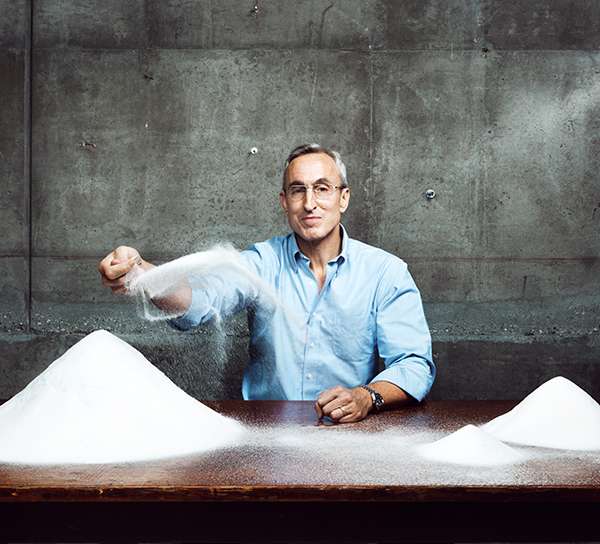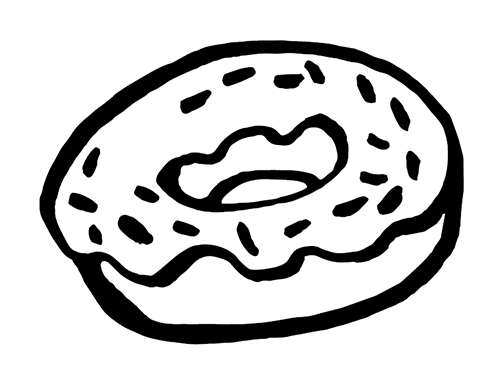Meet the Man Who Hated Carbs Before It Was Cool
Gary Taubes on how big sugar and big government wrecked the American diet

Science writer Gary Taubes has a knack for subverting conventional wisdom. Sixteen years ago, he published a groundbreaking feature article in The New York Times Magazine arguing that decades' worth of government-approved nutritional advice was flat-out wrong, ideologically motivated, and contributing to rising rates of obesity and diabetes. Traditional dieting guidance attacking fatty foods and praising carbohydrates, he wrote, was based on "a big fat lie."
Back then, Taubes was excoriated. (Reason published pieces both attacking and defending him.) But today his thesis is gaining ground among health and nutrition researchers. His work has been highlighted everywhere from The New York Times to Time magazine. Protein-rich regimens have taken off after millions of Americans found that stocking their pantries with supposedly "heart-healthy" snacks such as granola bars and fruit juice failed to improve wellness.

Taubes' latest book on the subject is The Case Against Sugar (Knopf), which describes the sweet stuff as a toxic substance akin to cigarettes that can and does kill. "Something's triggering the epidemic everywhere, and it's probably the same thing everywhere," he says. The ingredient "at the scene of the crime"—one that's stealthily packed into even our diet foods, and one we've been consuming in ever-increasing doses over time, he argues—is sugar.
In January, Reason's Nick Gillespie sat down with Taubes in his kitchen in Oakland, California, to talk about food, science, and the politics of both.
Reason: Your book is framed as a kind of prosecutorial case, meant to convict sugar as the chief cause of many of our society's health problems: obesity, diabetes, heart disease, other chronic illnesses. Can you lay out the opening argument?
Gary Taubes: It's meant to indict, but I'm not sure I could get a conviction.
We have obesity and diabetes epidemics everywhere. Worldwide, they manifest whenever a population shifts from whatever their traditional diet is to a Westernized urban diet, and so you could think of the Western diet and lifestyle as the vector that carries obesity and diabetes into these populations.
Describe the "Western diet." Is it processed foods?
Pizza Rolls, Kentucky Fried Chicken, McDonald's, Coca-Cola—
So the things we live for are the things that are killing us?
Something in our diet and lifestyle causes obesity and diabetes. Conventional wisdom is it's basically caloric overload. We eat too much and we're sedentary. Too many foods are available. They're packaged in a way that makes them irresistible. They have too much salt, fat, sugar. There's a whole host of theories around that idea, but ultimately it comes down to [the fact that] we take in more calories than we expend, and that causes obesity. Obesity increases your risk of Type 2 diabetes. Both those increase your risk of heart disease, cerebral vascular disease, stroke, cancer, Alzheimer's, you name it—every major chronic disease.
We see these chronic diseases appearing in populations when they make this nutritional shift, so the question is what is causing it? The argument I make in this book is that sugar has always been the prime suspect.
You say it's always been a prime suspect, but at least in the past 40 or 50 years, we've been told, "Don't worry about sugar. Worry about fat, worry about meat."
That's key to the story, and that's how I entered into it as an investigative journalist. We had this belief system that began as a hypothesis in the 1950s and started to be tested in the 1960s, which is that dietary fat causes heart disease. So by the 1980s, a "healthy" diet was being defined as a low-fat, low-salt diet.
And this explains SnackWell's fat-free cookies and things like that.
A whole genre of food. One of the things that happened in the '80s, when we embraced this low-fat healthy diet synchronicity, is the government, the [Centers for Disease Control and Prevention], started telling industry to produce low-fat foods. So the iconic example is yogurt, a high-fat food by definition. You remove some of the fat and now you have this insipid, watered-down, tasteless thing. To make it taste good, you put back fruit and sugar, and now you've got a "heart-healthy diet food."
Did the shift from a more balanced diet to a low-fat, high-sugar diet achieve the goals that were predicted for it?
You could look at heart disease mortality, and it's come down. The nutrition community says, "Look, people aren't dying from heart disease as much. Therefore, our advice is right." And then people like me say, "Yeah, but we're not interested in mortality, 'cause we're also selling billions of dollars in statins every year and billions of dollars in blood pressure drugs. We're doing hundreds of thousands of heart surgeries a year, putting in stents, doing bypasses. If mortality wasn't coming down, we'd have a real problem." Question is what's happening to the incidence. Are we seeing less heart disease because we're preventing it with changes in diet? And there's no evidence of that.
In the book you write, "One of the common themes in the history of medical research is that a small number of influential authorities—often only a single individual—can sway an entire field of thought." Why do you think that is?
Paradigms are founded when fields are small. They're fertile. The signal-to-noise ratio is high. If those scientists are good, you get paradigm shifts. We got the double helix and our understanding of the general principles of molecular biology when a half-dozen people led by Francis Crick, a former physicist, could determine what was going on. You take them away, you have no revolution.

In diabetes, you had Elliott Joslin in the U.S. He was a very caring, concerned, wonderful doctor, but not that good of a scientist, not that good of a critical thinker. And then you had Harold Himsworth in the U.K., who went on to become the head of the [government's] Medical Research Council. They were writing the textbooks. They were the ones being cited, and they were citing each other. If they got it wrong, everybody got it wrong. Our whole conception of obesity was determined in large part in the 1970s by half a dozen men untrained in science, who were, in effect, self-elected to run the field.
You describe an early battle between academic nutritionists, who overwhelmingly took the energy-balance approach to nutrition—you lose weight if you burn more calories than you take in—and what they characterized as quack doctors writing diet fad books, saying you can eat all the fat you want and you'll be fine as long as you stay away from sugar and refined carbs. Pork rinds good, cookies bad. And yet you say the quacks were actually closer to being right. Is this a place where the marketplace was more effective at hashing out the truth?
Yes. You have an academic research community that is dominated, post–World War II in the U.S., by nutritionists, who are studying animals for the most part. In 1959–60, Rosalyn Yalow and Solomon Berson invent the technology that allows hormones to be measured accurately, and the school of endocrinology explodes. The science finally has the tools to understand things like hormonal regulation of fat accumulation. Yalow and Berson say, look, insulin drives fat accumulation, so maybe the Type 2 diabetics are obese because of the insulin. And nobody cares, except the doctors.
The doctors are like all of us. They're getting fat. What do you do if you're getting fat? Well, you try what everyone tells you to do, which is eat less and exercise more. And if that doesn't work, which it doesn't, then if you're smart you look for other methods. Some of them read the diet books and tried various diets. Some of them read the same medical literature I did—Atkins famously read the same studies I read 40 years later. There's a conventional thinking that carbohydrates are fattening—bread, pasta, potatoes. Women describe them as going right to their hips. Maybe if I get rid of the carbohydrates and replace them with fat, because fat's the one macronutrient that doesn't stimulate insulin secretion, maybe I'll lose weight.
"Are we seeing less heart disease because we're preventing it with changes in diet? There's no evidence of that."
So people outside of the official research community were desperate to get skinny, or have their patients get skinny, so they tried a bunch of different things?
They try a bunch of different things. When you find one that works after a lifetime of failing…
Obesity is one of these subjects where it helps to have a weight problem. The way I describe it in my lecture is a male obstetrician can deliver 10,000 babies and won't understand childbirth as well as one woman who has given birth. It's just a fact of life. If you don't understand what it's like to get fatter and fatter, year in and year out, regardless of what you do, you just don't understand obesity.
You're a trim guy. Were you fat at some point?
I was chubby when I was a kid. My brother, you could see every vein on his body. He couldn't gain weight if he wanted to, and I was just a chubby kid. Puberty helped, and then I became an athlete and that helped. But my brother at his peak was 6'5″ and weighed about 195 pounds. Remember how Freud said anatomy is destiny? So he rowed crew. I was 6'2″ and could get up to 240. I played football. We both ate as much as we could. He was tall and thin. I was short and thick. That's just how we were built.
In the book, you document a long history of public nutrition advice being intertwined with politics in this country. So let's talk about the sugar lobby. How did King Sugar get its crown in the American economy and the American diet?
Well, sugar used to be very expensive and hard to get. It only grows in specific tropical regions. You can't just transport the sugar cane around the world and then refine the sugar out of it afterwards. You've got to get the sugar out quickly. It's a horrible job.
It was done by slaves.
It was done by slaves. The sugar industry is at the heart of the slave trade. Then the industrial revolution comes along beginning in the late 18th century, and suddenly sugar gets cheaper and cheaper to refine. In the 1840s the candy industry, the chocolate industry, and the ice cream industry all start up. In the 1870s–1880s you get the soft drink industry, with Coca-Cola and Pepsi-Cola and Dr. Pepper, and suddenly not only are you creating entirely new ways to consume sugar, but you're targeting children and women as the consumers of sugar. The soft drink industry in particular just explodes.
By 1900, we're consuming about 90 pounds per capita, which is almost a 20-fold increase in a century. It's like an arms race. The nutritionists say, "No, no, no, no, no," and the marketers say "If we don't do it also, we're out of business." By the 1960s, you've got cereals that are 40, 50 percent sugar—
And that are advertising as such, right? It was originally Sugar Frosted Flakes.
Tastes like a milkshake. You've got all of the smartest minds on Madison Avenue in the P.R. industry creating not just cartoon characters but entire Saturday morning cartoons—the ones we grew up on, like Rocky and Bullwinkle. I loved Rocky and Bullwinkle. It was a vehicle to sell cereal.
Gosh, I didn't realize. So in the Hague trial of cartoon characters against humanity, Rocky and Bullwinkle are as bad as Boris and Natasha?
You could look at it that way. Fruit juices come in in the 1930s. Sunkist, the coalition of California orange growers, they have to do something with their oranges 'cause they all come into season at once. You can't sell enough and you can't move enough so you turn them into juice. You sell them as juice and you advertise them as healthy because of the vitamin C. We're coming off this age of the new nutrition, which was all about vitamins and vitamin deficiency diseases.
You go back to what we evolved to eat, the sugar in those apples, and kids are now getting that within 20 minutes of waking up in the morning, and they aren't going more than an hour and a half or two hours without it. Over the course of a day, they're consuming almost a year's worth of what they evolved to eat.
The Department of Agriculture (USDA) and other government agencies that gave dietary recommendations wouldn't even think to say, "Well, glasses of apple juice and orange juice are sugar."
To this day, when you are told to eat a lot of fruits and vegetables, it's because they're vitamin-rich. The conventional thinking is that orange juice is healthy because it's full of vitamins. In the alternative thinking, the world I live in now, it's unhealthy because it's basically sugar water. You could take Coca-Cola, add a vitamin C tablet, and you got the same thing.

Talk about why the government has that blind spot.
The sugar industry was always a very powerful lobby, because sugar was a vital product import. The food industry was dependent on it. [So] the industry creates the Sugar Association basically to help advertise sugar consumption. Post–World War II the artificial sweetener industry begins to come of age. Saccharine had been around since the 1890s and cyclamates since the 1930s, and they're used in products that are sold for diabetics. People start thinking, "Hey, I'm getting fatter. I could drink these sugar-free, calorie-free drinks as well."
The newspapers now have something to measure, which is the amount of diet sodas being produced, so they can write about the diet craze. And the sugar industry has a problem, because people are saying sugar is fattening. So the Sugar Association starts saying a calorie is a calorie. That's the bedrock belief of the obesity community. They start P.R. campaigns to combat the argument that sugar is fattening. They do it by basically just taking what the nutritionists are giving them. But the nutritionists are giving them bad science.
Is the sugar lobby actually paying for studies?
They began paying for research during World War II. That was a common practice. The sugar industry kind of pioneered it. I don't think they did it for public relations reasons—they wanted to find other uses for sugar, so they funded some of the best sugar biochemists in the world. Science magazine would annually run articles about who they were funding. It helped cement some allies, because if somebody's been paying your bills for 20 years, you tend to be fond of them. That's where the conflict of interest comes in. In the 1960s, with this idea that dietary fat causes heart disease, some of the people pushing that happened to be longtime recipients of sugar industry largess.
What about the attack on artificial sweeteners? Cyclamates were banned in the late '60s, right?
In '69, yeah. Saccharine was almost banned, or it was for a bit. Now it carries warnings.
Where did the idea that these sweeteners were problematic come from?
Oh, they came from the sugar industry. The saccharine and cyclamates were direct competitors. Interestingly, here's where the beverage industry and the sugar industry split, because the beverage industry was happy to sell artificially sweetened drinks. Artificial sweeteners are cheaper. So Coke and Pepsi put out Tab and Diet Rite.

And Fresca. I'm thinking of all the horrible-tasting pre–Diet Coke diet sodas.
But the sugar industry saw it as a direct threat to their viability, and it was. There's a quote from The New York Times in my book, a sugar industry executive copping to spending a half-million dollars on research trying to find anything that an artificial sweetener does that's damaging. They would give female rats the equivalent of 60 cans a day of soda and then hope that they would produce rats with birth defects so they could say it was as bad as thalidomide. This executive is quoted as saying, "If someone could undersell you one cent to a dime, wouldn't you throw a brickbat at them if you could?"
So if our government and other public health institutions are consistently offering bad nutritional advice, what is the solution to that?
That's the problem, isn't it?
Is there a solution?
In the science in which I was raised—physics and chemistry, the hard sciences—the last thing you want to do is get an assumption accepted into the theory of how things work without rigorously testing it, because then people will build on it and it will grow and infect the whole thought construction. You end up with, I'm going to beat this metaphor to death, but sort of a house of cards. And there will be no way to go back on it. In a field like nutrition and obesity research, you've now got these enormous institutional dogmas built in that I and others are arguing are simply wrong. How do you get the institutions to change their belief systems?
The British Medical Journal is running a series on nutrition policy, and their way of dealing with it is by assigning writers from these different belief systems. So I'm a co-author on an article on dietary fat, along with the former head of the Harvard nutrition department who thinks I'm the worst journalist he's ever met and who does a form of science that I consider a pseudoscience.
But that is kind of the Enlightenment model of science, right? You have competing truth claims and you put them in a cockfighting ring?
What's the cockfighting ring? That's the key. The cockfighting ring is experimental tests. You have a hypothesis, you do an experiment, you intervene while limiting the number of variables you change. The problem with these sciences is you can't really test the hypotheses. They're too hard to do. I mean, you could if you had enough societal motivation. If you're willing to spend $10 billion, the way we do to try and find out if the Higgs boson exists in high-energy physics. You get everyone to work together, you identify the key questions, and you spend whatever money is necessary to do it.
Food producers spend billions of dollars a year on R&D. Are they capable of doing disinterested research?
Well, the assumption is no. Nowadays there's a whole journalistic industry of identifying conflicts of interest when researchers take money from industry. There are models which work better, where you just have the industry donate money for research to clearinghouses or to the government, which then identifies what things have to be studied. But the argument I'm making is that you have multiple generations of nutrition and obesity researchers who really fundamentally don't know how to do science. They don't know how to think critically, how to keep multiple hypotheses in their heads at one time, what it means to rigorously test hypotheses. So even if you had them do the studies, they would probably do a bad job.
"This whole story is about government interference that went awry. If they had stayed out of things…the scientists might have had time to get the science right."
You compare sugar to a drug. To go into kind of a different register of government malfeasance, the government has arbitrarily declared certain drugs good and certain drugs illicit. The war on drugs has been a failure. The war on tobacco I guess has been successful at helping to drive down the number of people who smoke. Are you proposing anything along the lines of a war on sugar?
No, government interference worries me the same way I think it worries you guys. This whole story is about government interference that went awry. If they had stayed out of things in the '60s through the '80s, and never inflicted us with what I think are these incorrect ideas, the scientists might have had time to get the science right. We might have really understood what's happening.
When the USDA sets up federal guidelines, those influence how people talk about things, how grants get given, what gets served in school lunches, etc. So there's an indirect power by which the government really does get to set a lot of dietary practice.
Yeah. I have what is maybe too simplistic a notion: We have these obesity and diabetes epidemics. Let's unambiguously identify the cause. Now we know what we shouldn't be eating. If we get that message across—
I don't know how much government regulation helped people cut back on smoking, and how much the awareness that smoking causes lung cancer did. I didn't quit because of government regulation. I quit because I don't want to kill myself, and I was coughing all the time. It was clear that was cigarette-related. If we could get people to understand, assuming I'm right, that sugar is the problem, then you get rid of sugar and refined high-glycemic-index carbs if you don't want to be obese and diabetic.

In the '70s and '80s there was a discount clothing guy named Sy Syms. He would always say, "An educated consumer is our best customer." There are always going to be quacks, and who is a quack and who is a legitimate scientist is always going to vary, but is the answer having voices out there forcing people to become educated, critical consumers of their own nutrition?
Well, again, it's hard to do, because there are all these different sources of information, and who do you trust? Do you trust the journalist, do you trust the vegan diet doctor, do you trust the ketogenic diet doctor, do you trust the researchers?
We can agree we don't trust Dr. Oz, though, right?
Yeah, for the most part. Diabetes prevalence in this country has increased 700 percent since the early 1960s. That's unprecedented. We have to get that straight. As long as we think it's eating too much and exercising too little and sedentary behavior, [we're in trouble]. And the obesity/diabetes community will say these are multi-factorial, complex diseases, which means the [National Institutes of Health] will fund thousands of researchers to look at hundreds of things, and we're going to say it's a little bit of this and a little bit of that. But something's triggering the epidemic everywhere, and it's probably the same thing everywhere.
The null hypothesis should be that it's something simple. Sugar's not just at the scene of the crime when it happens in populations. It's at the scene of the crime in the human body, which is the liver.
These are disorders that nobody wants. I think if we truly understood the cause, if we got it right, if that message was consistent from diet doctors to insurance agents to hospitals to physicians, then I think there would be a societal move to fix it. But again, we have to get the science right.
This interview has been condensed and edited for style and clarity.
This article originally appeared in print under the headline "The Man Who Hated Carbs Before It Was Cool."

Show Comments (38)